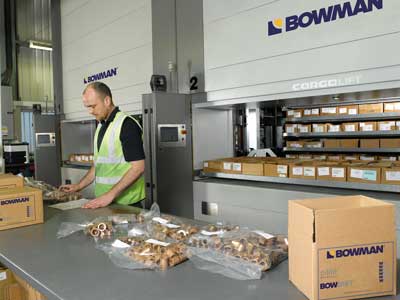 One of the most important asset of any bearings business is stock and the ability to react quickly to customer needs. If you cannot efficiently meet demand customers will look for a supplier who can. Craig Clydesdale of Bowman International analyses the benefits of bearings suppliers investing in high levels of stock.
One of the most important asset of any bearings business is stock and the ability to react quickly to customer needs. If you cannot efficiently meet demand customers will look for a supplier who can. Craig Clydesdale of Bowman International analyses the benefits of bearings suppliers investing in high levels of stock.
There is an widely accepted argument that forecasting “optimum stock levels” of a given component or spare, and only holding what is needed to cover predicted demand, is the best option for a business. It is certainly the option that most accountants would opt for, because it looks great for the bottom line, but what looks good on spreadsheets and financial forecasts does not always tell the whole story.
In industries where technology is constantly changing it makes absolutely no sense to stockpile thousands of units, only for them to become obsolete a few months down the line. The bearings industry, however, is unlikely to change. Indeed, bearings have not changed much since Leonardo Da Vinci sketched the first one 500 years ago!
Bearings suppliers who have the resources and logistical infrastructure to invest in high levels of stock, over and above what is “needed”, give themselves a huge competitive advantage over those who stick to forecast optimum stock levels – and they do so with very little risk.
 Stock holding
Stock holding
The most valuable aspect of holding a large inventory is the ability to hold stock for customers and stagger delivery. Many large companies in the bearings industry will insist that a customer places a large minimum order, takes delivery of the whole order as soon as possible and pays for the whole delivery in one hit. This can be problematic for smaller and medium-sized companies for a number of reasons. First, customers want to take advantage of the discounts available on large orders, but lack the physical space to take delivery of the whole consignment. Second, paying for, say, 6 or 12 months’ worth of components all at once has an impact on cashflow.
Increasingly customers are looking for suppliers who can offer the option to hold stock for them until they actually need it and only pay for what is delivered. This is a much more attractive option for a great number of businesses: they can still take advantage of price discounts but delivery and payment are spread out over a period of time.
An uncertain world
Natural disasters such as the volcanic eruption in Iceland in 2010 and the 2011 tsunami that his the north Pacific coast of Japan devastated supply chains in the short term. Though there is no way to ever fully cushion businesses against such eventualities, those that hold high levels of stock are the ones that are less affected by such disasters. Natural disasters are, thankfully, a very rare phenomenon. However, workforce strikes, transport disruption and failure of manufacturers are all too regular occurrences and can have a serious effect on supply chains. Loyalty to suppliers will quickly become a much lower priority if that supplier is unable to meet customer demand.
Security of supply
The benefits of holding a large stock profile in the bearings industry vastly outweigh any negatives. Businesses which hold high levels of stock are able to offer their customers an abundance of cost and logistical advantages over their competitors and are much better prepared for market uncertainty and supply chain disruption, but most importantly can offer their customers peace of mind. Customers are able to rest assured that whatever they require and whatever is happening in the world, their supplier will be able to meet their demand. Security of supply is indeed invaluable.

